The Best Low-Impact Cardio Workouts That Won’t Kill Your Joints
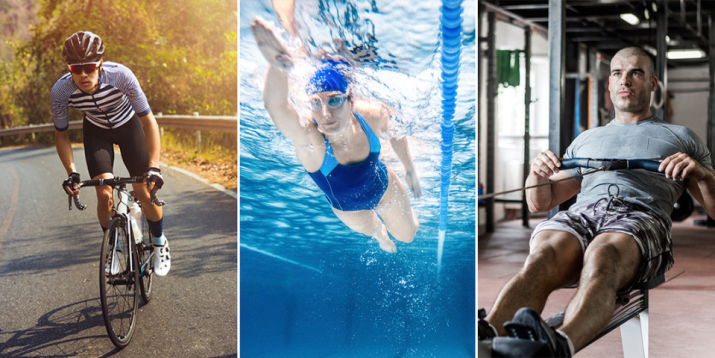
To many people, cardio is synonymous with running. While running is a convenient, inexpensive, and effective cardio workout, it can also be hard on your body. Luckily, there are plenty of low-impact cardio exercises that will still give you a sweat-worthy workout.
Switch out some — or all — of your running workouts for low-impact cardio workouts like cycling, yoga, and rowing, which all minimize wear and tear on your joints while strengthening your entire cardiorespiratory system, including your heart and lungs.
What Is Low-Impact Cardio?
Plain and simple, low-impact cardio involves exercise that raises your heart rate and challenges your heart and lungs without inflicting a lot of jarring force on your joints.
The reason running isn’t low-impact is because of the landing, explains orthopedic surgeon Dr. Nick DiNubile, chief medical advisor for American Council on Exercise.
“For every extra pound you carry, your knee reads it as five to seven pounds. So you’re talking about amplification of force when you’re running,” he adds.
But that doesn’t mean high-impact exercise is bad, necessarily. If you love to run and it doesn’t cause you pain, there’s no reason to stop.
But if you want to give your joints a break, or just want to try a new approach to increasing cardio fitness, give the following workouts a try.
Can I Lose Weight With Low-Impact Exercise?
Low-impact doesn’t mean low intensity or low results: Tour de France racers, competitive swimmers, and Olympic rowers all practice low-impact training — and are among the fittest athletes on the planet.
Reduced-impact exercise can be as intense or as mild as you wish, which makes it an effective approach for everyone from newbie exercisers to MMA athletes.
6 Low-Impact Cardio Workouts
Give your joints a rest and try some of these low-impact cardio workouts.
1. Swimming
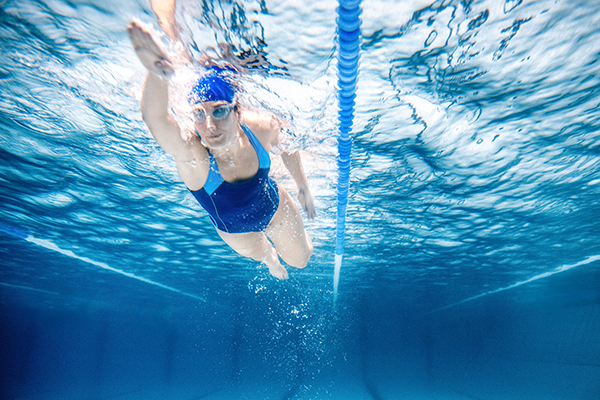
Swimming is the quintessential low-impact exercise. Water offers resistance in all directions, challenging your muscles in novel and beneficial ways without requiring you to pound your joints.
And unlike most other forms of cardio, swimming is upper-body focused, offering a great challenge to your back, chest, arm, shoulder, and core muscles.
Get started with some sample workouts below, or check out a few more here. And if you’re looking to brush up on your freestyle stroke, we’ve got a few pointers for that, too.
Beginner Swim Workout
16 x 50:
- Swim 50 meters. Rest 10 to 30 seconds. Repeat 4 times total to complete one set.
- Do up to four sets, resting 1 to 2 minutes between them.
Intermediate/Advanced Swim Workout
3 x 50, 150, 200
- Swim 50 meters at a fast pace. Rest 10 to 30 seconds and repeat a total of three times. Rest 1 to 2 minutes.
- Repeat the above, swimming 150-meter work sets, and then repeat again, swimming 200 meter sets.
- For a more advanced workout, repeat steps one and two in reverse order: 3 x 200, 3 x 150, and finally 3 x 50.
2. Cycling (indoor or outdoor)
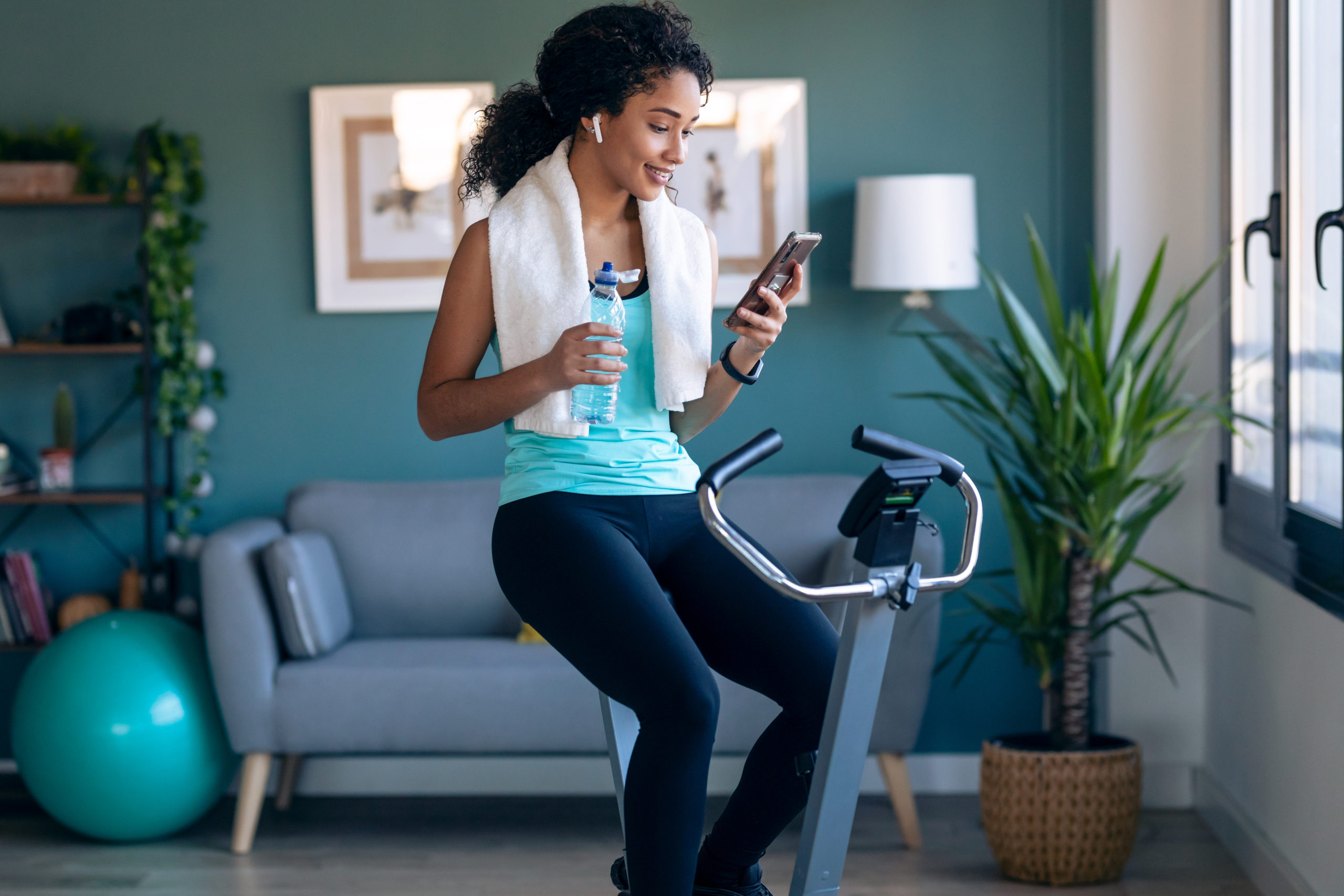
Whether you’re zipping along a country road, grinding up a mountain switchback, or furiously peddling in your apartment, cycling is a fun (and often scenic) way to get fit.
It’s also practical: Commuting and running errands on a bicycle can save time in traffic and reduce your carbon footprint. The fact that cycling is easy on your joints is a bonus.
Cycling is almost entirely lower-body focused, so be sure to round out your bike training with some upper-body and core work on days you aren’t spinning your wheels.
For the outdoor workouts below, you’ll need a basic bike computer — a small investment that will help you track distance, speed, pedaling cadence, and calories burned.
The BODi Bike tracks all these personalized metrics, plus your heart rate, for customized rides that help you get the most out of all your cycling workouts.
And when you’re ready for cross-training, the screen swivels out so you can transition to floor workouts, which range from HIIT and cardio to recovery and mobility.
Speed Cycling Workout
3–4 x 6–8 minutes @ 90 rpm
- On a flat surface, ride in a low gear, aiming to keep up a high cadence (pedaling speed — we recommend 90 rpm for this workout) for 6 to 8 minutes.
- Rest or pedal easily for 3 to 4 minutes. Repeat 3 to 4 times total.
Power Cycling Workout
6–8 x 3–6 minutes @ 65 rpm
- On a long, gradual hill, ride in a low to medium gear that drops your cadence to about one pedal stroke per second (65 rpm).
Endurance Cycling Workout
4–6 x 4 minutes @ 60 rpm, 2 minutes @ 100 rpm
- Choose a high gear and pedal at a low cadence for 4 minutes, and then downshift and pedal at a higher cadence for 2 minutes.
- Repeat the cycle a total of 4 to 6 times.
3. Elliptical
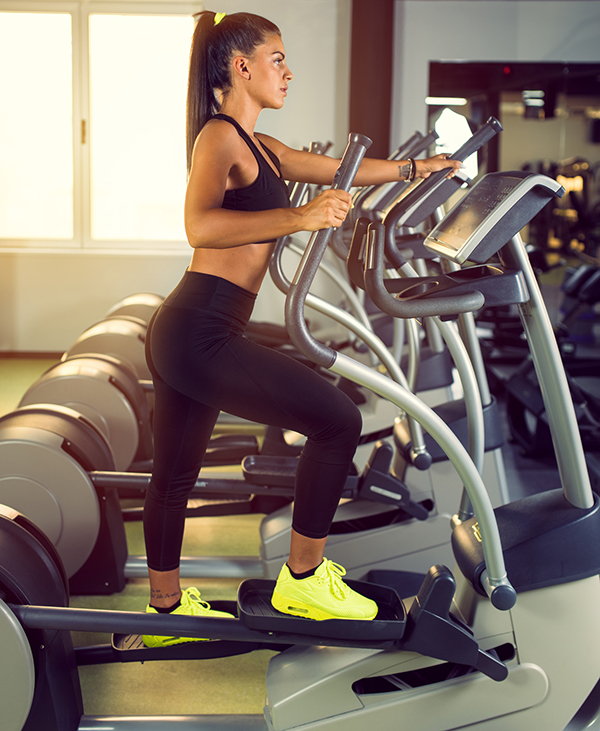
It’s easy to see why elliptical trainers are among the most popular cardio machines in the gym.
By combining upper-body and lower-body movements, ellipticals can offer a more comprehensive workout than running, and they can help you burn a decent amount of calories to boot.
In addition to adjusting the incline and resistance, you can also choose to pedal backward — an option that challenges different muscles than front-to-back pedaling.
Most elliptical trainers have workout options built right in: Enter a few simple data points (age, gender, weight), punch in “HIIT” or “MOUNTAIN,” and you’re good to go.
Failing that, you can put the machine on manual and work with any of these options:
HIIT Elliptical Workout
- After a 5-minute warm-up at an easy pace, pedal for one minute at an effort level of 8 or 9 out of 10.
- Drop down to level 5 for 2 minutes.
- Perform 5 to 7 rounds, alternating between cycles of high and low effort.
- Finish with 3 minutes of easy pedaling.
Strength-Endurance Elliptical Workout
- After a 5-minute warm-up at an easy pace, pedal for 10 to 15 seconds at an all-out 10 effort level.
- Drop down to a level three for 45 to 50 seconds.
- Perform up to 10 rounds, alternating between cycles of high and low effort.
- Finish with 3 minutes of easy pedaling.
Cardio-Endurance Elliptical Workout
- After a 5-minute warm-up at an easy pace, pedal for 20 to 60 minutes at a 6 to 7 out of 10 effort level.
- Finish with 3 minutes of easy pedaling.
5. Rowing
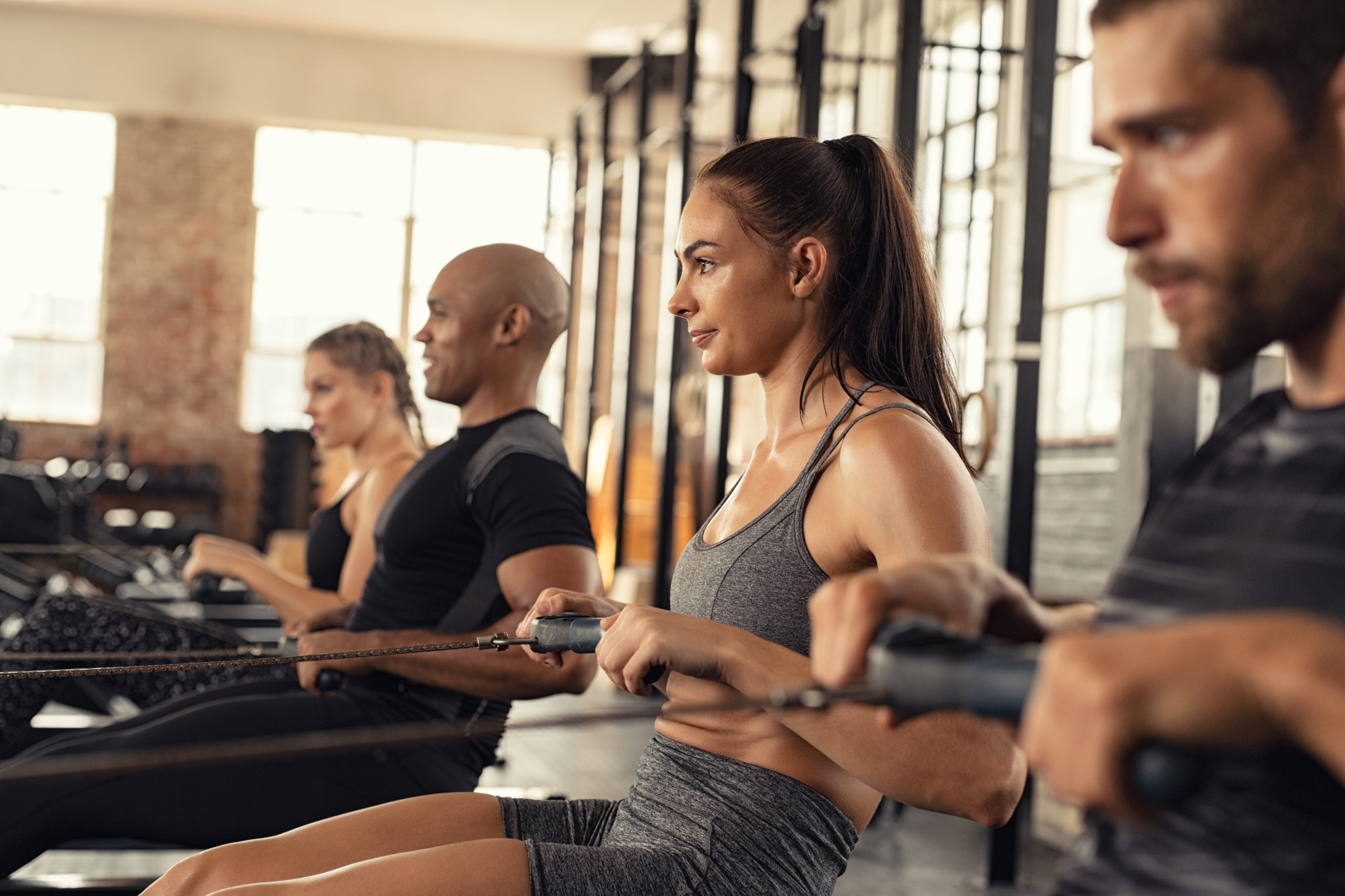
Indoor rowing allows you to work the entire body — particularly the legs and back — with very little impact. Rowing emphasizes spinal extension — a boon for desk jockeys, whose 9 to 5 forces their backs into a hunch.
The rower is a great machine to attack when you feel like clicking into beast mode, but there is some technique to rowing.
Remember this sequence: legs, torso, arms, arms, torso, legs. That’s the order in which your body parts should move.
To master proper technique, consult an online guide or (better yet) a trainer, and then dive into this low-impact cardio workout.
Power Rowing Workout
For this one, you’ll need to enter your information into the machine so you can track how many calories you burn each minute in real time.
- For the first minute, row until you burn one calorie, and then rest for the remainder of the minute.
- The second minute, rest after you’ve burned two calories.
- The third minute, rest after you burn three calories, and so on, continuing until you can’t hit the target calorie burn for that minute (try to make it to 20 minutes if you can). Note how long you were able to go — and try to beat it next time!
Endurance Rowing Workout
3–5 x 1500m
- Row 1500m at a challenging, but manageable pace.
- Rest 1 to 2 minutes and repeat a total of 3 to 5 times, trying to sustain or beat your previous time with each effort.
5–10 x 500m
- Row 500 meters at a challenging pace.
- Rest 1 minute, and repeat a total of 5 to 10 times, trying to sustain, or beat, your previous time with each effort.
5. Yoga
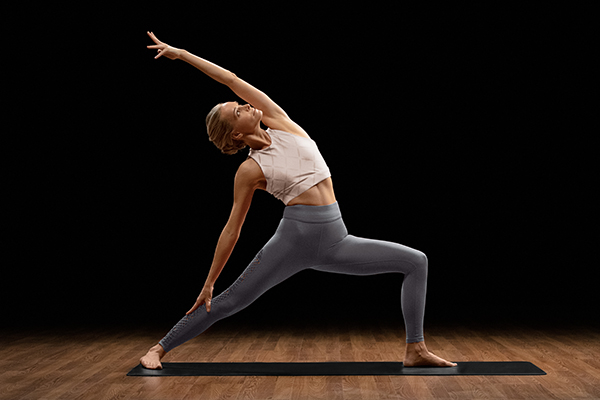
Originally conceived as a way to make long periods of motionless meditation more comfortable, yoga has evolved in the West into a one-stop shop for fitness.
Advanced poses can train your flexibility, balance, and overall body control. Power poses such as warrior and chaturanga variations can build strength and muscle.
Restful poses can enhance recovery and leave you refreshed.
Not all yoga will give you a cardio burn, but certain practices — like vinyasa flow — will definitely get your heart rate up. By performing the more challenging poses in a faster, more dynamic manner, you can create a cardiovascular challenge that inflicts minimal stress on your joints.
At-Home Yoga Workouts
Check out the many yoga classes offered in Yoga52 and Beachbody Yoga Studio on BODi to start transforming your body from the comfort of your own home!
6. MMA
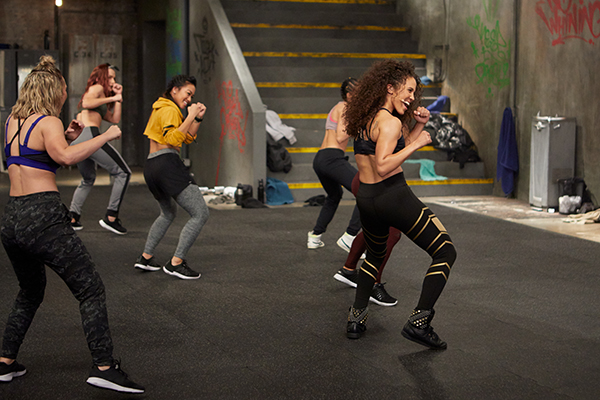
Like yoga, martial arts training can take many forms. And just like all yoga isn’t cardio, not all MMA workouts are low-impact.
In thai boxing, you’ll kick heavy bags till you drop; in aikido, you’ll practice falling up to 200 times in an hour; in Western boxing, you’ll pound focus mitts until your hands ache. Not so easy for the joints.
But, if you remove the pads and mitts and focus on punching and kicking into the air, you get a high-intensity, coordination-enhancing workout without having to slam your legs and your hands into any object.
There are plenty of MMA moves and combinations that will work your upper and lower body, and tax your cardiovascular system.
At-Home MMA Workouts
To try it out yourself, cue up Rough Around The Edges on BODi. This MMA-inspired workout program is led by six badass Hollywood stuntwomen who can help you challenge your whole body, get lean, and feel powerful without killing your joints.
If you want to punch and kick your way to a shredded core, check out Core De Force on BODi. With a combination of boxing, kickboxing, and Muay Thai, these workouts will build cardio endurance and strength while improving mobility and flexibility.
With no equipment necessary, this program gives you all you need for a stronger, slimmer physique.
